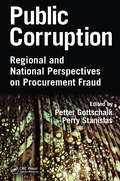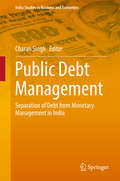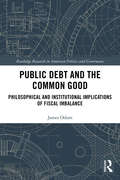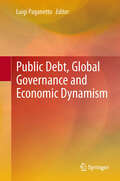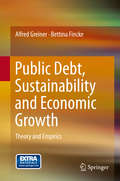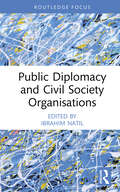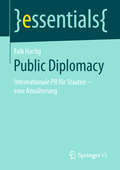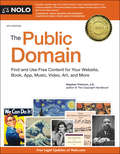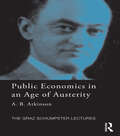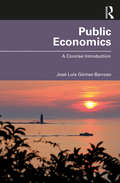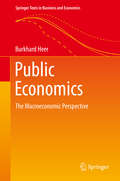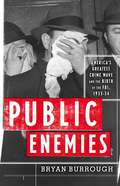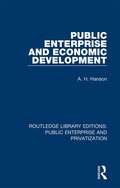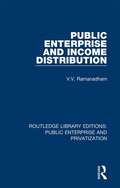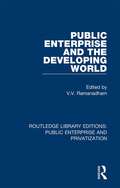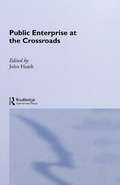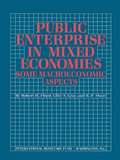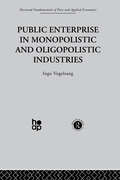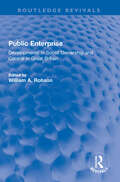- Table View
- List View
Public Corruption: Regional and National Perspectives on Procurement Fraud
by Perry Stanislas Petter GottschalkThis volume presents the latest scholarly research on the practice of public corruption. The authors explore the causes and methods of fraud-related crime, as well as how it can be detected. The book also investigates the best strategies to prevent corruption, as well as convention punishments for those convicted. Intended for criminal justice students and practitioners, Public Corruption: Regional and National Perspectives on Procurement Fraud is a valuable resource for all stages of fraud investigation.
Public Debt Management
by Charan SinghThis book examines the objectives of public debt management and the re-emerging issue of separating monetary policy formulation from fiscal and debt management. The recent Great Recession has resulted in a rethink of the objectives and working of macroeconomics, and in many countries, including India, has led to the scope of fiscal operations being expanded and debt-to-GDP ratios increasing significantly. Consequently, debt management has encountered considerable difficulties, and the need for coordination between monetary and debt management has assumed greater significance. The book discusses the important issue of the independence of central banks and the need for coordination between debt managers, monetary authorities and finance ministries if debt operations are separated from monetary management.
Public Debt and the Common Good: Philosophical and Institutional Implications of Fiscal Imbalance (Routledge Research in American Politics and Governance)
by James OdomThe American national debt stands at $20.49 trillion as of January 2018, or roughly $63,000 for every person in the United States. The national debt has grown six-fold in the past 25 years, and borrowing only has accelerated in recent administrations. What are the factors driving such unrestrained borrowing? Is American fiscal policy different now than in an earlier era? Is there a moral dimension to public debt and, if so, how can that dimension be measured? Public Debt and the Common Good addresses these and other questions by looking to the fiscal policy of the American states. Drawing on classical themes and the longest quantitative review of state debt in the literature, James Odom expertly integrates institutional analysis with dimensions of culture to define the parameters of political freedom in a theoretically coherent way. In doing so, Odom argues that centralization and injustice, or the incapacity for the common good, can help explain state indebtedness. Contributing to ongoing scholarly debates on public debt theory, this book will be of interest to students, scholars, and practitioners who work at the intersection of political philosophy and economics, as well as those who specialize in state public policy, state politics, and federalism more generally.
Public Debt as a Form of Public Finance: Overcoming a Category Mistake and its Vices (Elements in Austrian Economics)
by Richard E. WagnerEconomists commit a category mistake when they treat democratic governments as indebted. Monarchs can be indebted, as can individuals. In contrast, democracies can't truly be indebted. They are financial intermediaries that form a bridge between what are often willing borrowers and forced lenders. The language of public debt is an ideological language that promotes politically expressed desires and is not a scientific language that clarifies the practice of public finance. Economists have gone astray by assuming that a government is just another person whose impulses toward prudent action will restrict recourse to public debt and induce rational political action.
Public Debt, Global Governance and Economic Dynamism
by Luigi PaganettoThis volume presents a selection of contributions to the XXIV Villa Mondragone International Economic Seminar on "Public debt, global governance and economic dynamism". For the past 23 years, the Seminar has provided an ideal opportunity to meet and discuss the most topical issues in economic research. The quality of the scientific contributions and ensuing debates has consistently been outstanding owing to the participation of leading experts, and the most recent Seminar was no exception. The Seminar was held against the backdrop of high levels of public debt, especially in Europe, combined with very low growth in productivity. Furthermore, markets have been dominated by financial instability, raising the question of whether this is the result of the high debt levels or insufficient economic dynamism. Among the topics covered in this book are the economic challenges and growth policies in the United States; issues relating to the G20, global governance and regional integration; EU governance, growth and the Eurozone crisis; and EMU policy and public debt. Individual contributions also address the impact of labor market reforms, the need for sectoral rebalancing in the Euro area, fiscal multipliers and public debt dynamics, and the effects of fiscal shocks in Italy. The book concludes with a contribution on policy recommendations.
Public Debt, Sustainability and Economic Growth
by Alfred Greiner Bettina FinckePublic debt has become a severe problem for a great many economies. While the effects of tax policies on the allocation of resources are readily derived, the mechanisms that make public deficits and debt influence the economy are not so easily understood. This book elaborates on the effects of public debt starting from the intertemporal budget constraint of the government. It is shown under which conditions a government can stick to the intertemporal budget constraint and then, demonstrated how public debt affects the growth process and welfare in market economies. The effects are derived for models with complete labor markets as well as taking into account labor market imperfections. The focus in this book is on fiscal policy issues, but it also deals with monetary policy aspects. The theoretical analysis is complemented with empirical time series analyses on debt sustainability and with panel studies dealing with the relationship between public debt and economic growth.
Public Diplomacy and Civil Society Organisations (Routledge Explorations in Development Studies)
by Ibrahim NatilThis book explores the roles of civil society organisations (CSOs) when engaging in public diplomacy activities and their impact on community development and change. It provides up-to-date analysis of the challenges and constraints facing CSOs involved in diplomatic missions and working with foreign donors. Bringing together case studies from Cameroon, Egypt, Poland, Palestine, Lebanon and Libya, this edited collection reflects on how external calls for proposals in the fields of women’s empowerment, community development, education, training, exchange programmes, democracy, human rights and peacebuilding influence the way civil society organisations contribute, deliver, intervene and position themselves in various societies. It explores the lessons learnt by various CSOs in identifying societal problems, understanding grassroots demands, prioritising development agendas and campaigning for peacebuilding. Grounded in a firm theoretical framework and based on up-to-date empirical research, the book reflects on the leadership shown by civil society organisations in development, politics and business and their impact on community development initiatives and local change process. This book will be an important resource for researchers, policymakers, donors, NGO practitioners and the beneficiaries themselves, within the areas of international development, peacebuilding, civil society, politics and international relations.
Public Diplomacy: The Rise Of Confucius Institutes (essentials)
by Falk HartigDiese essential führt kompakt in das Konzept der Public Diplomacy ein. Public Diplomacy wird international in Wissenschaft und Praxis umfassend debattiert und praktiziert, in Deutschland findet der Begriff bisher allerdings nur wenig Beachtung. Es erläutert die Hintergründe, skizziert Akteure, Instrumente und Zielgruppen sowie ähnliche Begriffe. Zudem wirft das essential Schlaglichter auf bisherige Forschungslücken und leitet Möglichkeiten für weitere Forschungen ab, die sowohl für Wissenschaft und Praxis relevant sind.
Public Disclosure and Bank Failures
by Eduardo Levy Yeyati Tito CordellaA report from the International Monetary Fund.
Public Domain, The: How to Find & Use Copyright-Free Writings, Music, Art & More (Intellectual Property Law Ser.)
by Stephen FishmanFind free content and save on permission fees Millions of creative works—books, artwork, photos, songs, movies, and more—are available copyright-free in the public domain. Whether your tastes run to Beethoven or Irving Berlin, Edvard Munch or Claude Monet, you’ll find inspiration in The Public Domain. The only book that helps you find and identify which creative works are protected by copyright and which are not, The Public Domain covers the rules for: writings music art photography architecture maps choreography movies video software databases collections For the first time in decades, new works began to enter the public domain in 2019, and more are entering each year. The 9th edition is completely updated to include new public domain resources and to cover the latest legal changes to copyright protection of songs, books, photos, and other creative works, as well as public domain rules outside the U.S.
Public Economics
by Gareth D. MylesThis textbook provides a thorough treatment of all the central topics in public economics. Aimed at senior undergraduate and graduate students, it will also be invaluable to professional economists and to those teaching in the field. The book is entirely self-contained, giving all the equilibrium theory and welfare economics needed to understand the analyses. The author covers the Arrow-Debreu economy, welfare economics and the measurement of inequality and poverty which lay the foundations and emphasise the important role played by information. Within the competitive economy, he examines commodity taxation, income taxation and tax reform in a certain environment. He goes on to study the public economics of uncertainty, and then treats public goods, externalities, imperfect competition and tax evasion as departures from the standard competitive assumptions and looks at their implication for public economics derived.
Public Economics in an Age of Austerity (The Graz Schumpeter Lectures)
by Tony AtkinsonGovernments all round the world are facing problems with their public finances. At a time of austerity, how much should spending be cut and how much should taxes be raised? Does the national debt represent a burden for future generations? Should taxes on the rich be raised? This book examines how the tools of public economics can be applied to answer such key questions and to suggest alternatives to the austerity policies currently being pursued. The fiscal problems faced are not simply the result of the post-2008 economic crisis but reflect a deep-seated fault line in modern economies. There has to be fiscal consolidation to provide for an ageing population, increased investment in education, and climate change. The book describes how public economics can help us think about alternative ways of meeting this challenge. It casts doubt on conventionally held views, such as those concerned with top tax rates, the undesirability of taxing capital income, the targeting of child benefits, and the merging of income tax and social security contributions. The final part goes beyond national boundaries and considers global public economics, focusing on the pressing problem of financing development. The conclusion of the book is that there are significant choices to be made. Not all austerity packages are the same: there are alternatives. It would be possible to raise taxes more and to cut spending less. It is important to consider the full range of possible policies. In considering these alternatives, modern public economics provides a useful framework, but it has major limitations. Economists are too often prisoners within the theoretical walls they have erected and fail to see that important considerations are missing. Economists have paid too little attention to the ethical basis underlying their policy recommendations.
Public Economics: A Concise Introduction
by José Luis Gómez-BarrosoPublic Economics: A Concise Introduction provides a concise and non-technical overview of the role of government in the economy. Using the questions ‘why?’, ‘what for?’ and ‘how?’, the text initially surveys the place of the public sector in a market economy. It then considers the possible reasons which could justify government involvement. Next, the book examines the aims of state economic activity, and the instruments which a government has at its disposal. Lastly, the final chapter provides an illuminating tour of economic history and history of economic thought in relation to government economic activity. The book offers an international focus throughout, with examples taken from all over the globe. Readers are supported with a range of pedagogical features, including example boxes, chapter objectives and summaries, and end-of-chapter multiple choice and reflection questions. Public Economics: A Concise Introduction will be a valuable text for students on courses in public economics, welfare economics, public finance, public policy and related areas.
Public Economics: The Macroeconomic Perspective (Springer Texts in Business and Economics)
by Burkhard HeerToday, the most pressing challenges for public economics are of macroeconomic nature: pensions, debt, income distribution, and fiscal sustainability. All these problems are compounded by the phenomenon of demographic transition and aging. This graduate textbook addresses these issues with the help of state-of-the-art macroeconomic tools that are based on a sound microfoundation and rooted in empirical evidence. Different from the standard partial-equilibrium analysis in traditional textbooks on public economics, the concept of general equilibrium helps to account for compensating or amplifying side-effects of economic policy. GAUSS and MATLAB computer code as well as teaching material (slides) are available as downloads from the author's homepage.
Public Enemies: America's Greatest Crime Wave and the Birth of the FBI, 1933-34
by Bryan BurroughThe establishment of the FBI as a force against gang crime in the early 1930's.
Public Enemies: America's Greatest Crime Wave and the Birth of the FBI, 1933-34
by Bryan BurroughIn Public Enemies, bestselling author Bryan Burrough strips away the thick layer of myths put out by J. Edgar Hoover’s FBI to tell the full story—for the first time—of the most spectacular crime wave in American history, the two-year battle between the young Hoover and the assortment of criminals who became national icons: John Dillinger, Machine Gun Kelly, Bonnie and Clyde, Baby Face Nelson, Pretty Boy Floyd, and the Barkers. In an epic feat of storytelling and drawing on a remarkable amount of newly available material on all the major figures involved, Burrough reveals a web of interconnections within the vast American underworld and demonstrates how Hoover’s G-men overcame their early fumbles to secure the FBI’s rise to power.
Public Engagement Made Easy: A Guide for Planners and Policymakers
by Susan CharlandLocal leaders don’t need to become professional facilitators or hire expensive consultants to run a great meeting. Public Engagement Made Easy offers practical and affordable methods that bring ease to one of the most challenging aspects of any local leader’s role: involving the public. The tools and techniques in this book will empower planners, public managers, decision-makers, and other leaders to implement effective public engagement programs that build trust within communities and contribute to successful decisions that stand the test of time.
Public Enterprise and Economic Development (Routledge Library Editions: Public Enterprise and Privatization)
by A. H. HansonOriginally published in 1959, the subject of this book is an aspect of economic development which, despite its importance, had rarely attracted more than incidental attention at the time. The author’s interest in public enterprise in underdeveloped countries was stimulated by a year’s residence in Turkey. He felt the time had come for a general comparative study. Defining comparative as (1) between developed and underdeveloped countries, and (2) between different underdeveloped countries at dissimilar stages of development or with dissimilar development perspectives. The purpose of the first is to discover what the developed can offer the underdeveloped by way of adaptable experience and relevant ideas; that of the second to examine the use of public enterprise in the many different social, economic and political contexts to be found in the less advanced parts of the world.
Public Enterprise and Income Distribution (Routledge Library Editions: Public Enterprise and Privatization)
by V. V. RamanadhamHow amenable is public enterprise to the implementation of national distributional policies? This is the question explored here by Professor Ramanadham. Originally published in 1988, he examines the various channels through which distributional effects take place through their operations, and draws attention to the implicit conflicts of interest among consumers, workers, and tax payers. He focuses on the problems associated with the use of public enterprises as instruments of distributional goals and examines the question of whether direct budgetary measures on the part of government would be preferable. There are detailed analyses of the distributional implications of wage incomes, prices, and surpluses in the public enterprise sector. Finally, the author comments from the distributional angle on the results of privatization. Here is a detailed study of the way in which public enterprise may be employed as an instrument of redistribution of income and wealth, also of the extent to which this is feasible.
Public Enterprise and the Developing World (Routledge Library Editions: Public Enterprise and Privatization)
by V. V. RamanadhamOriginally published in 1984, this book grew out of the papers (and discussions) presented at the Seminar conducted at London Business School during March-June 1983, with a focus on the problems of public enterprise in the context of the developing world. Essentially, three facts of thought emerged: first, on the working of public enterprises in developing countries; second, on joint ventures and consultancies involving public enterprises in the two groups of countries; and third, on the value and relevance of experience of public enterprises in developed countries, particularly in the UK, for the developing countries. Broadly, the Chapter 1 belongs to the first category, Chapters 6 and 7 to the second and Chapters 8 to 13 to the third. The concluding review seeks to highlight some of the major issues that deserve notice in the light of the views expressed in the papers and the discussions that took place on them.
Public Enterprise at the Crossroads
by John HeathIn many parts of the world public enterprise is in crisis. Privatisation programmes are being widely touted as the solution to many of the problems of inefficiency and slow rates of growth associated with public enterprise. This book discusses the underlying causes of those problems, and critically examines some of the solutions that have been adopted. Its geographical coverage is wide and it cuts across the political spectrum. The experiences of countries in four continents are analysed in an attempt to shed light on current dilemmas. Recurrent patterns are found; problems are frequently seen to be political as much as economic, and bureaucracy and administrative confusion is often found to be at the heart of poor financial performance.Yet since political aims, economic environment, and administrative and managerial capabilities vary so widely, universal solutions remain more difficult to define than universal problems.
Public Enterprise in Britain: Thoughts on Recent Experiences (Routledge Library Editions: Public Enterprise and Privatization)
by V. V. RamanadhamOriginally published in 1959, the author has observed at first hand the workings of public enterprise in Britain. He has coupled objectivity with an acute sense of economic perception and has produced a clear and ordered study of the workings of nationalization in industry at the time. His book does not contain an argument on whether nationalization is desirable or not. On the assumption that there is nationalization he attempts to discuss certain important problems raised by it in the fields of management, pricing, resource allocation and public control. He hopes that a discussion of this nature will contribute towards ensuring the most satisfactory results from nationalization.
Public Enterprise in Mixed Economies
by Robert H. FloydA report from the International Monetary Fund.
Public Enterprise in Monopolistic and Oligopolistic Enterprises
by I VogelsangPublic enterprises remain of fundamental importance in advanced economies, and this volume characterises them as hybrids, influenced by markets and ministries.
Public Enterprise: Developments in Social Ownership and Control in Great Britain (Routledge Revivals)
by William A. RobsonFirst Published in 1937, Public Enterprise presents a broad overview of the numerous public boards and commissions established in Britain during early twentieth century. These bodies have been entrusted with the operation of vital public utilities and the regulation or organization of national industries. The book discusses leading examples such as the Port of London Authority; the British Broadcasting Corporation; the Central Electricity Board; the London Passenger Transport Board; the Coal Mines Reorganization Commission; and the Public Service Board, to showcase their importance in the economic and social life of the community. This book is a must read for scholars and researchers of business and economics, British politics, and political science.
